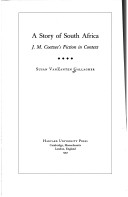The publication of "Age of Iron" established J. M. Coetzee as one of the foremost writers of the day. In this study of Coetzee's fiction, Susan Gallagher places his work in the context of South African history and politics. Her historical readings of Coetzee's six major novels explore how he lays bare the "dense complicity between thought and language" in South Africa. Following a description of the difficulties facing writers under apartheid, Gallagher recounts how history, language and authority have been used to marginalize the majority of South Africa's people. Her story reaches from the beginnings of Afrikaner nationalism to the recent past: the Sharpeville massacre, the jailing of Nelson Mandela, and the Soweto uprising. As a result of rejection of liberal and socialist realism, Coetzee has been branded an escapist, but Gallagher defends him against this charge. Her examination of his novels demonstrates that Coetzee's fictional response is "apocalyptic in the most profound Biblical sense, obscurely pointing toward ineffable realities transcending discursive definition".
Viewing Coetzee's fiction in this context, Gallagher describes a new kind of novel that "arises out of history, but also rivals history". This analysis reveals Coetzee's novels to be responses to their time and place as well as rewarding investigations of the storyteller's art.
- ISBN10 0674839722
- ISBN13 9780674839724
- Publish Date 1 October 1991
- Publish Status Out of Stock
- Out of Print 3 July 2012
- Publish Country US
- Imprint Harvard University Press
- Format Hardcover
- Pages 272
- Language English
